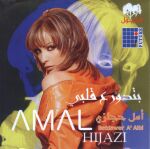
Haifa Wehbe is a Lebanese singer and actress. She has released seven studio albums, and made her acting debut in the 2008 Pepsi-produced film Sea of Stars. In 2006, Wehbe was on People Magazine's 50 most beautiful people list.

Najwa Karam is a Lebanese singer, songwriter, and fashion icon. Karam has created her own style which blends traditional and contemporary Arabic music and has helped spread the Lebanese dialect in Arabic music. Najwa Karam was the highest-selling Middle Eastern artist in 1999, 2000, 2001, 2003, and 2008. She is known for her vocal powerhouse Mawwal talents and has gained an international audience due to her distinct blend of traditional Lebanese music and contemporary sounds. In 2011, Karam debuted as a judge on the reality competition television series, Arabs Got Talent; she has since appeared on all six of its seasons. In 2017, Forbes Middle East ranked Karam number 5 on the list of "The Top 100 Arab Celebrities" with over 26.58 million social media followers. In 2018, Cosmopolitan included Karam on their list of "The 15 Most Inspiring Women In The Middle East", and Forbes included her on their list of the "Top 10 of Arab Stars On The Global Stage".

Rotana Records is the Arab world's largest record label. It is owned by the Rotana Group, established by Mohammed and Ahmed Nagro later sold to the Saudi Prince Al-Waleed bin Talal, who sometimes personally signs artists to the label. Rotana Records is part of a media empire that includes a film production company, a magazine of the same name, a record label, and seven music channels. More than 100 artists are signed to Rotana.
Nelly Makdessy is a Lebanese singer, songwriter, record producer, instrumentalist and model. Nelly started her career in the amateurs TV program "Kaass El Noujoum" which was broadcast on the Lebanese channel LBC in early 1990s, she sang in the category of Folklore Music. Makdessy released four albums in her career and eleven singles. her first album ' produced two hit singles including "Shouf El Ein" and "Machie Al Maghror". It was her most successful album until the 2005 album Oof Oof.
Amal Hijazi is a Lebanese singer. Hijazi released her debut album, Akher Gharam, in 2001, followed by her second album, Zaman in mid-2002. This album included four number one hit singles, "Zaman", "Oulhali", "Einak" and "Romansyia". Her third album Bedawwar A Albi was released in early 2004 followed by the release of her fourth album Baya al Ward in 2006. The album's breakthrough song of the same name caused the entertainer to face negative critical publicity and a number of controversies.
Arabic pop music or Arab pop music is a subgenre of pop music and Arabic music.

Akher Gharam is the debut album by the Lebanese singer, Amal Hijazi. It spawned the number one hit singles "Habibi Oud", "Ghanniet" and "Akher Gharam. The album was released in mid-2001 and produced by Dilara Master Production and distributed internationally by Music Master. The album's title track was generally considered Hijazi's signature song until it was replaced by the international single "Zaman" in 2002. The album also spent six months at the Top Twenty Charts and became the highest selling debut album ever released by an Arabic artist. The song "Akher Gharam" in addition became a #1 Lebanese hit. In addition, Hijazi's previous single "Rayyah Balak" was included in the album due to popular demand from fans.
"Einak" "(Your Eyes)" is a song recorded by the international raï star Faudel and Lebanese singer Amal Hijazi. The song was released in 2002, being a major hit of the year and a prominent release from Hijazi's second album Zaman. It was the video of the song that made it a hit and started an unusual public fascination with Hijazi. In the video, she is seen dancing and lying next to Faudel and she sings about her love. In addition, Hijazi had returned with a completely new look of blonde, short hair that also helped her to attract attention.

Bedawwar A Albi is the third studio album by the Lebanese singer Amal Hijazi released in 2004. It was her first album under the label Rotana. Produced by Stallions Records with a sponsorship deal with Pepsi and Future Television, the album saw a huge drop in sales compared to her previous album Zaman but it was also because of lack of promotion in countries like Lebanon, Egypt, UAE, and Jordan. Despite everything that happened, Bedawwar A Albi managed to become one of the highest selling albums of 2004 in Lebanon despite of the hot competition from the albums of other singers like Elissa and Nancy Ajram. In addition, the album released two number one hit singles "Bedawwar A Albi" and "Mistanie Eiy".

Baya al Ward is the fourth studio album by the Lebanese singer Amal Hijazi released under the label Rotana in 2006. For the project, Hijazi collaborated with renowned producers like Jean Saliba and Fady Bitar and worked with some of the biggest names in the industry like Elias Naser, Samer Nakhla and Haytham Ziad. Despite of the negative publicity and controversies over the album's theme, it was a commercial success, topping various charts in countries like Lebanon, Egypt, Syria, Morocco, Tunisia, UAE, and Kuwait. In addition, the album received generally positive reviews in the west and was sold highly in the UK, France and Canada.

Zaman is the second album of the celebrated Lebanese singer, Amal Hijazi. Ranging from fast-beat, pop songs like "Comme çi, Comme ça", "Einak" and "Romansyia" to classical love-ballads like its title track "Zaman" and "Oulhali" this album is considered to be one of the most popular and biggest-selling albums Arabic albums ever. The title track, "Zaman", became a blockbuster hit and the music video was broadcast all over the Arab Satellite Channels. Even today, "Zaman" is considered one of the greatest Arabic hits ever and is perhaps Hijazi's best known song. Many fans consider this particular album that rose Hijazi to her fame.
"Baheb Nuoa Kalamak" is an Arabic pop song written by Ahmed Darwesh and chosen for Amal Hijazi's album, Baya al Ward. This fast-beat song was released in the early 2007. The music video was directed by Mirna Khayat. It was chosen over Yahia Sa’adeh.
"Zaman" "(The Past)" is the lead single from Amal Hijazi's 2002 album Zaman, widely considered as her signature song. The single up till that time was considered to be Hijazi's best known and most popular song, and went on number one in a number of countries like Lebanon, Syria, Jordan, Egypt, Algeria and Morocco. "Zaman" is one of the most recognisable and successful songs of the early 2000s and has been considered to be an international hit.
"Nefsy Tefhimny" is an Amal Hijazi single released in mid-2007. The song was specially written for Hijazi by the famed Ramy Youssef.

Kolma N'arrab is the eighteenth full-length Arabic studio album from Egyptian pop singer Angham. The album was released on 10 June 2007 in Egypt, on 15 June 2007 in Middle East, and 3 July 2007 worldwide. On the first day of its release, the album's tracks were available to buy from iTunes. The album features what Angham describes as "an image of who she actually is, without retouch or fakeness, exposing to her audience her raw personality." The album has been both a critical and commercial success, after a commercially failed previous album despite its creativity, and has so far sold in excess between 850 000 and 980 000 copies in the Middle East. Some sources revealed that Rotana, Mazzika and Dream channels confirmed that the record of Kolma Nearrab is 800 000 CD, placing the record in a second position among the best-selling records released in 2007 in Middle East. Moreover, elBayan newspaper stipulated that the record sold half a million CD since 18 August 2007 and the number of sales is still escalating. Broadcast intensively one week prior to the album's release in the market, its first single "Kolma N'arrab" was filmed as a music video by director Ahmad elMahdy in Egypt and was ranked, upon its arrival to Rotana's Top 20 chart, at rank eleven before it moved to rank one after seven consecutive weeks. Rotana's spokesperson, Tony Semaan, assured the record has now a platinum certification.

Bahibbik Wahashteeny is the seventeenth full-length Arabic studio album from Egyptian pop singer Angham, launched in Egypt on 25 July 2005 by Rotana Production Company. It was her second record on the label after "Bet'heb Meen" which was released in 1997. The 2005 record has witnessed a critical success but commercial disappointment. "Bahibbik Wahashteeny" is perhaps the least sold record during Angham's entire singing career in the last 10 years, but improved its sale gradually upon the broadcast of its second single "Bahib Nafsi". However, despite the promotion and Angham's 2005 tour, the record had only a moderate success and Angham was unable to garner any hits from the album except "Albak" and "Inta Meen" which both caused a tremendous success around the Middle East and the Gulf countries, respectively. The record is available on both CD and tape format. The bonus track "Inta Meen" and the remix of "Bahibbik Wahashteeny" are only featured on the CD version. In this record, Angham collaborated with many new faces. They include Hend elKady who worked with Angham for the first time as a music composer; her brother Khaled Suleiman and Ismael as new music arrangers; Ameer Teaima, Sultan Salah, Wissam Sabry, Khaled Abou elFateh and Fahd Thamal as the new lyricists.

"Un Poco de Amor" is a song by Colombian singer-songwriter Shakira, taken from her third studio album Pies Descalzos. It was released on May 16, 1996, by Sony Music and Columbia Records as the fourth single from the album. The song was written and produced by Shakira and Luis Fernando Ochoa. "Un Poco de Amor" is a Latin pop song that incorporates reggae elements. Lyrically, it states that Shakira is waiting to find someone who loves her.

"Amor de Mujer"(English: "Woman's Love") is a song recorded by Mexican singer Paulina Rubio for her debut solo studio album La Chica Dorada (1992). Released as the album's second single on January 1993 in Mexico, and as the third single on May 29, 1993 in the United States, the song has subsequently appeared on most of Rubio's compilation albums, including Top Hits (2000) and Mio: Paulina Y Sus Éxitos (2006). Like most of Rubio's early material, it was written by Gian Pietro Felisatti, José Ramón Flórez and César Valle.

Tesada'a Bemeen is the seventh studio album by Lebanese singer Elissa, released by Rotana on December 26, 2009. This is her fourth album released by Rotana Records. Elissa won her third World Music Award for best selling artist of the Middle East in recognition of the sheer success of the album's commercial performance. With the release of second single "Aa Bali Habibi", the song experienced immense success and is considered to be Elissa's signature song.

Ayza Aeesh is the 43rd studio album by Moroccan recording artist Samira Said. The album was released by Rotana Records on November 5, 2015. Ayza Aeesh marks Said's first album in over seven years since Ayaam Hayati (2008) was released in summer 2008. Ayza Aeesh is also Said's first collaboration with Arab World's largest music label Rotana Records, owned by Prince Al-Waleed bin Talal after her departure from her previous record label Alam El Phan.












